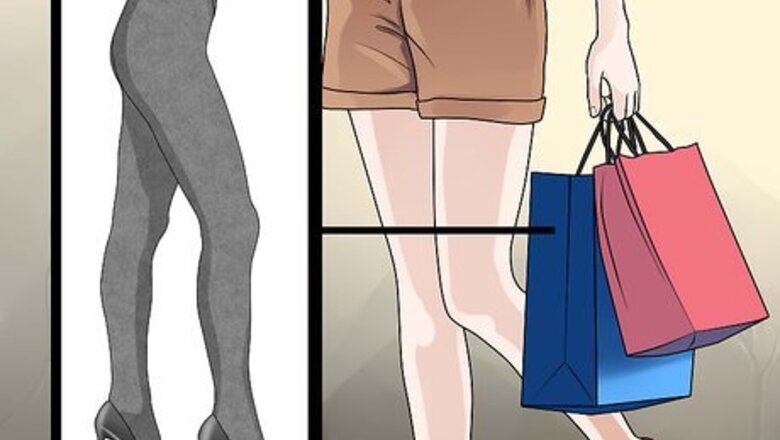
views
Buying and Caring for Hosiery
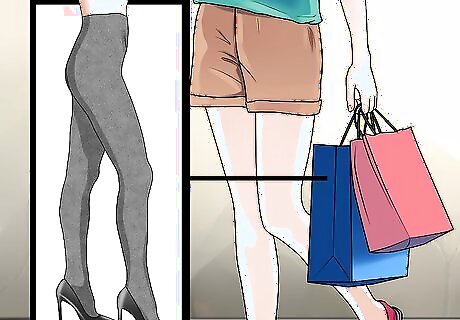
Choose thicker hosiery. Choose thicker, opaque tights over thin and sheer ones, as these will be sturdier and less likely to catch and run. Look out for tights that list a denier count on the label, which is a measurement for the thickness of tights. Choose a higher denier count for a sturdier wear. Choose a thicker knit or "sweater tights" in colder months for a very durable pair that it closer in thickness to leggings.
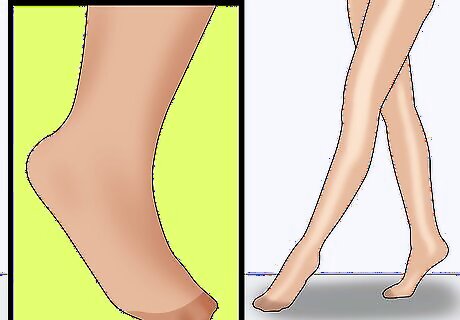
Look for reinforced toes. Find tights that have a reinforced toe area around the seam to prevent toes from causing runs or holes, especially when they rub up against the inside of your shoes. Try slipping on thin no-show socks over or under tights to lend extra reinforcement to the toe and heel areas. During the winter you can wear thicker and taller socks under boots for even greater protection. Also make sure the shoes you wear with tights fit well and don’t rub too much. Purchase inserts made from smooth gel to help your shoes fit better and not rub against tights.
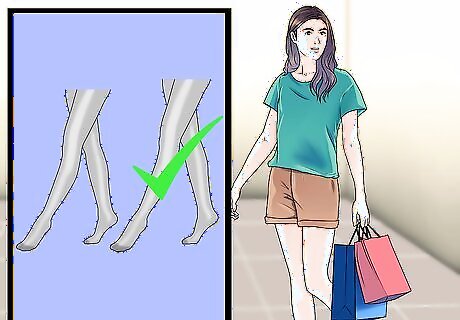
Buy one size up. When you’re buying tights, opt for a pair in a size up from what you normally wear if possible. This will prevent extra stretch or pulling which could make tights more susceptible to runs. Look for “Tall” sizes for a longer fit, whether you actually have long legs or you just want some more allowance to prevent runs.
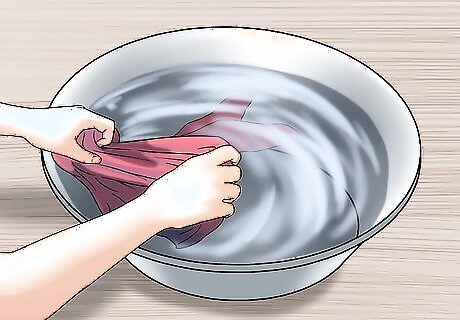
Wash tights and stockings by hand. Launder your hosiery separately from other garments, ideally by hand or in a lingerie bag if you put them in the washing machine. Keep garments with clasps, zippers, or other metal fastenings well away from tights in the wash. Use a mesh lingerie bag with a very fine weave, as tights can actually work their way out of holes in a looser-weave bag in the wash. Avoid high heat in the dryer, excessive washing, or harsh detergents and fabric softeners, as these could all wear out the fibers of tights quicker over time. Use mild detergents meant for delicates, set your washer to the delicates setting, and hang or lay the tights flat to dry.

Put new tights in the freezer. Follow this unusual trick of leaving your tights in a plastic bag in the freezer until you wear them. The cold may contribute to strengthening the fibers, leading to fewer runs. Run new tights under water, wring out the excess, then seal them in a plastic bag before putting them in the freezer. Take them out before you want to wear them to let them thaw gradually before pulling them on. You need only do this before the first wear of new tights, but if you think it may help them last longer, you can continue to store tights in the freezer until you want to wear them.
Wearing Hosiery
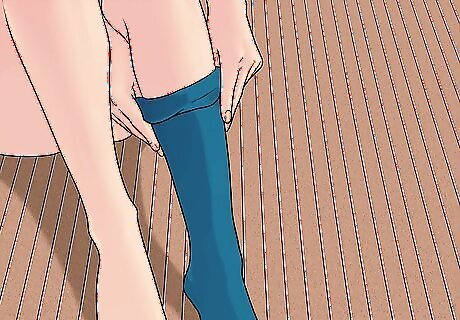
Pull tights on carefully. Gather all of the material of one leg of your tights between the thumb and forefinger of each hand, all the way to the toe. Then slip your foot inside and pull the tights up the rest of your leg, releasing the gathered fabric in one gentle motion rather than pulling and yanking it in stages. Ensure that when you pull on a skirt or dress that no zippers or other fastenings catch on the material of your tights. EXPERT TIP "To avoid runs, moisturize your hands before putting tights on, or even try wearing gloves." Veronica Tharmalingam Veronica Tharmalingam Professional Stylist Veronica Tharmalingam is a Personal Stylist who runs her fashion consulting business, SOS Fashion, in Los Angeles, California and Paris, France. She has over 10 years of experience crafting stylish wardrobes for men and women. Veronica is also a professional model and has worked with international brands like Harrods, LVMH, and L'Oreal. Veronica Tharmalingam Veronica TharmalingamProfessional Stylist
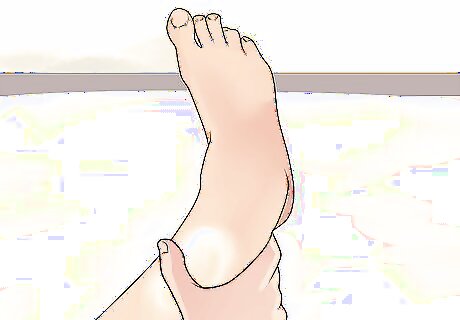
Keep fingernails and skin smooth. Examine your fingernails and toenails before pulling on tights. If you have any that are too long with jagged or sharp edges, cut or file them down to a smooth curve. Moisturize your legs and feet to prevent cracked or peeling skin from catching on tights. Focus on your heels when you moisturize, as they can commonly develop more cracks and rough callouses. You may even want to exfoliate with a pumice stone or scrub if you have very rough skin on your feet. You can also moisturize your hands right before putting tights on to keep rough surfaces and hangnails from catching as you’re pulling and manipulating the tights with your fingers.

Wait to put on jewelry. Put on rings, bracelets, or watches only after you’re done pulling on and adjusting hosiery, as these can easily catch on the material. Remember to remove your jewelry again before taking off the tights at the end of the day or night. Toe rings can also easily catch on tights when slipping your foot into them. Remove toe rings if you plan to wear tights. They won’t show in closed shoes anyway.
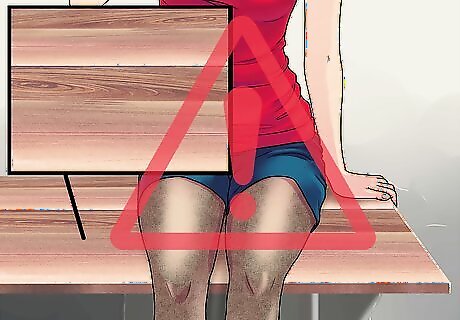
Be mindful of what you sit on or lean up against. While wearing your tights out, avoid surfaces or other objects with rough, sharp, or uneven textures, as they can catch on your tights if you come in contact with them. For example, a concrete or wood bench or step could harm your tights when you sit down on it. Try to pull clothing over tights, place something between your tights and the surface, or choose a different seat altogether. Hardware and sharp embellishments on your own shoes can also ruin your tights while you’re walking or crossing your legs, so opt for smooth footwear before you go out.
Preventing Larger Runs
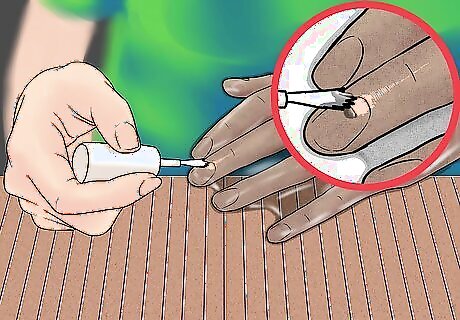
Apply clear nail polish. Remove hosiery that already has a small run or snag as soon as possible. Place your hand into the leg of the tights where the run is and paint a dot of clear nail polish on the edges of the tear. Allow the tights to dry completely before wearing. It’s important that you have your hand or another object like a piece of cardboard or paper in between the two layers of the tights, as you do not want the nail polish to stick the two sides together as it dries. You can use colors other than clear for the nail polish, but it should match the color of the tights or not show a visible difference. Have a washcloth and nail polish remover on hand for any accidents, and avoid getting nail polish on your skin at all costs.
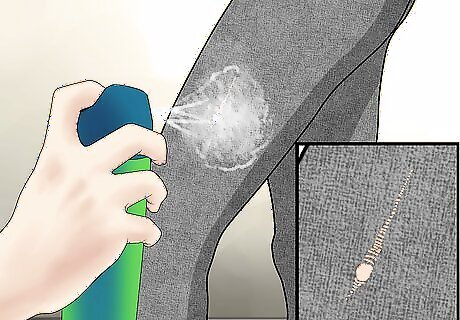
Spray on a small amount of hairspray. Apply hairspray to the beginning of a run to keep it from spreading any wider. Spray on the thinnest layer possible, as you don’t want your tights to get sticky or gunky. You can also use hairspray as a preventative treatment. Spray a very thin coat across the entire surface of your tights to help strengthen the fibers against snags and runs. Note that unlike nail polish, hairspray will wash away, so keep water away from your tights while you’re wearing them and reapply hairspray as needed after a wash cycle.
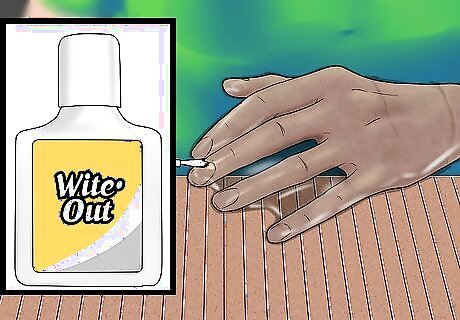
Use Wite-Out. Brush Wite-Out onto the beginnings of a small run in your tights. Apply to the edges of the run just like you would with the nail polish method. Use this treatment only if your run is in an unnoticeable area or if your tights are white, otherwise the Wite-Out can stand out too much. Note that Wite-Out also washes out, so it will need to be reapplied after exposure to water.

Trim excess fibers. If any fibers in your tights are loose or sticking out, trim them very carefully by pinching the fabric around the loose thread and then cutting it away at the base. This will prevent loose fibers from getting caught and snagged in the future. Note that cutting at threads could cause unraveling and weakening of nearby fibers. Apply a dab of clear nail polish to the area before or after cutting.
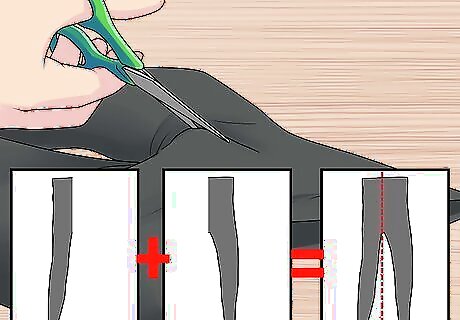
Cut up tights that are beyond repair. Buy tights in multi-packs of the same weight and color. If you get irreparable runs in the right leg of one pair and the left leg of another, simply cut off the ruined leg on each and wear the two pairs together to look like one single, run-free pair. This tip allows you to conserve and get more use out of the same pair of tights so you don’t have to buy new ones as often. Don’t cut into the upper portion of the tights that goes around your hips and waist. In other words, don’t convert your tights into thigh-highs while you’re cutting; keep the waist so that each leg stays up.


















Comments
0 comment